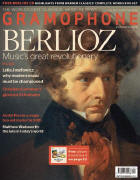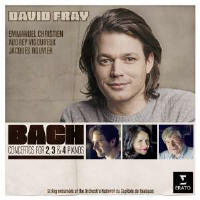Texte paru dans: / Appeared in: |
|
|
Outil de traduction (Très approximatif) |
|
|
Reviewer:
Harriet Smith The first thing that strikes you about this disc is the acoustic, and not in a good way. It’s very boomy (the venue is the Carmelite Chapel in Toulouse) and has a tendency to make it sound as if there’s a cast of thousands in the strings, which is certainly not the case. That aside, there’s some joyous playing on offer here, with David Fray leading an all-French line-up of keyboard players. First up is the Concerto for four keyboards, BWV1065, whose opening movement has plenty of bounce and pinpoint reactions between the four soloists. Alexandre Tharaud recorded this via multitracking, feeling that this was the only way to get a truly rhythmically taut result, yet this new disc rather belies that notion. The slow movement is a haloed affair in the hands of Fray & co, more overtly Romantic than Tharaud’s, and the finale has a rumbustiousness that I find very appealing. The D minor Triple Concerto, BWV1063, is again full of energy, and the keyboard players are alive to the ebb and flow of the opening movement; by comparison la famille Casadesus are positively staid, which is a particular issue in the outer movements. Bach’s siciliano middle movement is more forgiving, working equally well at Casadesus’s spacious tempo or in Fray’s more bright-eyed version. Among the double concertos, Fray and the aptly named Audrey Vigoureux are particularly telling in the C minor, BWV1062: their slow movement is a true conversation between equals, whereas there’s slightly more emphasis on the first keyboard in the account by Güher and Süher Pekinel, though there’s no doubting the finesse that the twins bring to everything they do. In BWV1061 in C major, the fugal finale is another highlight, Fray and Jacques Rouvier sparking off each other to fine effect. But I marginally prefer the Pekinel twins in the opening movement, which is a little brisker. And in the Double Concerto in C minor, BWV1060 (better known in its oboe-and-violin incarnation), again, the opening Allegro sounds a touch steady (though not as steady as Robert and Gaby Casadesus), but it’s less a matter of speed per se than the phrasing itself – perhaps I’ve been spoilt by spending too much time in the alluring company of violinist Janine Jansen and oboist Ramón Ortega Quero. That said, the Adagio’s entwining lines against pizzicato strings are beautifully realised by Fray and Emmanuel Christien, and the finale has plenty of gusto. So overall, don’t let a dodgy acoustic put you off some very fine Bach-playing. |
|




